Peter MALONE
Saturday, 18 September 2021 20:00
Tribe, The
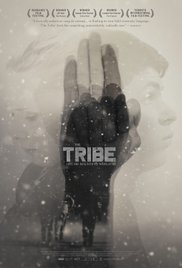
THE TRIBE
Netherlands/Ukraine, 2014, 126 minutes, Colour.
Directed by Miroslav Slaboshpitski.
The Tribe is a confronting film in many ways.
First of all, all the protagonists hearing-impaired. There is unspoken dialogue in the film, only the use of sign language and no subtitles – but presented in such a way that most audiences will be able to pick up what is happening and assess many of the motivations. While the protagonists do not hear anything, natural sounds that the audience can hear are included in the film. There is no musical score.
With financial assistance from the Netherlands, this is a Ukrainian production, filmed in an old school in Kiev. The settings are grim, old-style institutional buildings, corridors and rooms. The other main setting is a parking area for trucks and truck drivers, again a grim look with desaturated colour.
A young man, Sergei, is seen at the opening of the film seeking directions and finding his way to the school, where he is put in a class, a group of the young men taking him to his room but playing tricks on him, pushing him into a girl’s room, finding him a bunk, going through his belongings, a lot of horseplay but with malice.
Two of the girls are seen changing their clothes, being taken to the truck centre, the young man knocking on all the trucks and drivers picking up the girls for sex. This activity is repeated throughout the film. Sergei is attracted towards one of the girls and begins a sexual relationship with her. The other young men are harsh on him, and, while he seems to go along with their treatment of him, resentment builds up.
Some of the authorities at the school are seen to be in collusion with the young men and with the girls, some visitors also having a relationship with the girls.
The girls want to get out of Ukraine and Italy seems a prospect, one of the contacts organising them to go to the embassy, join the line-up for passports or visas, and able to use contacts to get them passports.
This has a fatal impact on Sergei, who then goes to the rooms of the girls and of the young men, bashing and bludgeoning all of them on the head, killing them – and going into whatever future he has.
The film won many awards at film festivals and commentators noted that it could stand as a symbolic representation life in Ukraine – reinforced after the release of the film by the Russian attacks on Eastern Ukraine and the civil uprising that followed.
Impressive in its way of using sign language without dialogue and music. Depressing in its picture of human nature.
Published in Movie Reviews
Published in
Movie Reviews
Tagged under
Saturday, 18 September 2021 20:00
Somewhere I'll Find You

SOMEWHERE I'LL FIND YOU
US, 1942, 108 minutes, Black-and-white.
Clark Gable, Lana Turner, Robert Sterling, Patricia Dane, Reginald Owen, Lee Patrick, Charles Dingle, Van Johnson, Keenan Wynn, Leonid Kinski, Keye Luke, Sara Haden, Rags Ragland, Grady Sutton.
Directed by Wesley Ruggles.
Somewhere I’ll Find You is a film of its time, released in the latter part of 1942, in the aftermath of Pearl Harbor and the rapid Japanese expansion in the Pacific, especially in the Philippines.
It is a story of journalists, war correspondents, commentary on articles from Europe at the outbreak of World War II, the attitude of appeasement by some American editors, as well as postings in Indochina and the Philippines, and reporting from the front in the Philippines and the loss of Bataan.
It is also a romance, beginning with two brothers in conflict over their love for the one woman, but this is resolved fairly quickly, but with the woman infatuated by the older brother, throwing herself at him, his acceptance and then moving on, her going to Hanoi as a reporter, her becoming involved in the smuggling of children out of China, going to Manila and war reports. As might be expected, the unhappy and unlucky suitor is killed in action.
The cast is strong, with Clark Gable and his charm as the older brother, Robert Sterling as the younger, and Lana Turner, early in her career, as the woman in love.
There is a very strong supporting cast with Charles Dingle as the recalcitrant editor, Lee Patrick and Reginald Owen as an older couple who are friends with the reporters, and Van Johnson and Keenan Wynn in very early performances turning up at the end of the film with significant roles in the attack on the Japanese forces and their landing.
The film ends with battle sequences, but also with a very patriotic sequence where Clark Gable dictates an article praising the heroism of the dead soldiers and insisting that their names be recorded.
1. A film of its time? The US, before declaring war on Japan, appeasement for Germany, ignoring Japan? Pearl Harbor? The aftermath?
2. Newspaper journalists, publication, the perspectives? In Europe? In the United States? In the Far East, Hanoi, Manila?
3. Black-and-white photography, New York settings, apartments, restaurants, newspaper offices, the contrast with Indochina, city of Hanoi, jungle, Manila? The battle sequences in Bataan? Musical score?
4. The cast, Clark Gable as a romantic hero, Lana Turner early in her career, the strong supporting cast?
5. The editor, appeasement, Jonny and Kirk, in Germany for three years, point of view, getting the editor to read the article, taping it, putting it as a headline, hold over the editor and embarrassing him?
6. Kirk, his relationship with Paula, talking with Jonny, going home, Edie and Willie, the stockings advertisements? Friends of the two young men?
7. Jonny going to his room, Paul in the shower, their meeting, the memories of the past, the romance? Going out with Jonny, the restaurant? Jonny talking with Kirk, Jonny being harsh on Paula? Disappointment, clash?
8. Paula and the assignment to the Far East? Not wanting to take it, hoping Jonny would ask her to stay? The kiss goodbye?
9. Jonny, the job, letters to the editor, the two brothers coming back, sent to Hanoi to find Paula, the contact with the veteran journalist, information, going up country, Paula and the child refugees, her collapse, listening to Jonny, his care for her?
10. Manila, Jonny and his drinking, Crystal and the pickup, Paula arriving, Jonny getting Kirk and Paula to sail to Australia?
11. Jonny on the front, the officers and their talk, the Japanese landing, the battle, the deaths? Kirk and his dying? The strong battle sequences?
12. Jonny, dictating the story, remembering the names, Paula arriving, surviving, their being together?
13. The significance of this kind of propaganda film making and release in 1942?
Published in Movie Reviews
Published in
Movie Reviews
Tagged under
Saturday, 18 September 2021 20:00
American Heist
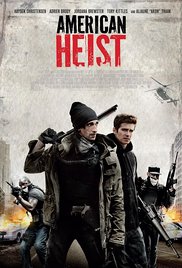
AMERICAN HEIST
Canada, 2014, 94 minutes, colour.
Hayden Christensen, Adrien Brody, Jordana Brewster, Tory Kittles.
Directed by Sarik Andreasian.
The title is quite generic, indicating that this is symbolic of American bank robberies – which it may or may not, given the fact that robbery resembles so many over the decades.
This is a Canadian production with an Armenian director, filmed in New Orleans.
Adrien Brody gives quite a powerful performance as a criminal with a hard family background, becoming involved in crime, stealing for the family, involved in a robbery, shooting a policeman, sentenced to 10 years in jail where he was humiliated, the shadow of the man he was, who gets out of jail, feels indebted to those who protected him in jail, going to see his brother after 10 years, great affection for him, and then being forced to be involved in another robbery.
Hayden Christensen, best known as Annikan in the Star Wars prequels, is a rather impassive screen presence, especially in comparison with the Adrien Brody. Jordana Brewster, probably best known from the Fast and Furious series, is Christensen’s girlfriend who works at the police precinct.
Tory Kittles, prominent in television series, but also appearing in the Australian film, The Sapphires, is the ruthless criminal in charge of the robbery (reminiscent in look and style of a younger Denzel Washington).
The film choreographs the robbery with some expertise – but the main focus is on the relationship between the two brothers.
1. An American crime story? American cities, criminal backgrounds, bank robberies, family relationships?
2. Canadian production, American settings, the city, prisons, homes, police precincts, banks, the streets? The musical score?
3. The title, generic? How American this kind of heist? Motivations? Participants?
4. The introduction to Frank, in prison, 10 years, the shower, the tattoos, his belongings, getting out, picked up by his friends, the drinking, the drugs, the women? At the garage, meeting James? The 10 years of absence, his love for James, James and his resentment, being in prison, never seeing his brother? The memories of their father’s death, the mother, her behaviour? The promise of a job, real estate?
5. James, mechanic, the 16 months in prison, the effect? His applying for a loan and being refused? Working on cars, fixing Emily’s? His love for Emily, meeting her again, fixing the car, out with her, the encounter, his saying he had to leave? Her being hurt, going to work, at the police station, taking messages, surveillance?
6. Frank and his friends, the drive to meet them, the police pursuing, James and his expert driving? The friends, their threats, cords James, for Emily?
7. The planning of the robbery, Frank and his wanting to go straight, the memory of shooting the policeman? James and his unwillingness? The leader and his threats?
8. The plan, visualised, James not liking it?
9. The issues of cars, James getting rid of his, picking up others? Frank and his picking up the yellow car and its being ineffectual?
10. The robbery itself, the bank, the customers, the staff, the usual aspects of a robbery, surveillance cameras, collecting money, going to the vault, the shooting of the manager?
11. The plan going wrong, the shooting, the police being informed, the coordination of the police, the machine guns, Frank getting wounded? James coming back in, tending him, reassuring him, brotherly affection, getting the coat from the customer, Frank taking him out as a hostage, his being shot, James and the ambulance, his vest, escaping and walking away?
12. The robbers, the violence, the shooting, in the streets, hedged in, defiance, shot?
13. The open ending, Emily watching it on the cameras screens, James walking away? To what?
14. The film claiming that this is typical of American robberies, executions and motivations?
Published in Movie Reviews
Published in
Movie Reviews
Tagged under
Saturday, 18 September 2021 20:00
Pride and Prejudice and Zombies
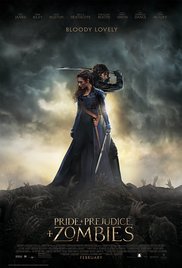
PRIDE AND PREJUDICE AND ZOMBIES
UK, 2016, 107 minutes, Colour.
Lilly James, Sam Riley, Jack Huston, Bella Heathcote, Douglas Booth, Sally Phillips, Charles Dance, Lena Headey.
Directed by Burr Steers.
Well, the title tells all. The film is based on graphic novel by Seth Graham Smith – who gets equal credit for book origin with Jane Austen.
We know that if a butterfly flaps its wings in the Amazon, there could be quite some chaos halfway around the world. It is not known what the repercussions were of so many thousands of Jane Austen devotees suddenly raising their eyebrows as they heard of this particular and challenging title. It could have been more than quite chaotic.
Many novels are adapted, as well as the plays of Shakespeare for instance, to contemporary settings. With Jane Austen, it happened in the 1990s with a contemporary American high school version of Emma, Clueless, which received enthusiastic reviews. This time, Jane Austen’s period, the setting, characters and manners are all retained, costumes and decor getting particular emphasis. Of course, it is the contemporary zombie conventions that enthusiasts will be upset about.
We know where we are quite early in the film when Darcy (Sam Riley) is introduced as a colonel, a zombie hunter, and we are giving a lesson on British history, especially British colonialism which is suffering the backlash of imperial attitudes by the seeds of the living dead transported back to the mother country. The main specification about the zombies that they have to eat the brains of the living to be transformed! At a game of the whist in a country mansion, a zombie is revealed – with Darcy coming quickly to the attack with his blade.
Move to the Bennett family, with Charles Dance as the mild-mannered Mr Bennett, Sally Phillips as the mother whose goal is to have her daughters married, the attractive Jane (Bella Heathcote) and the older daughter, with a touch of the cynical, Elizabeth (Lilly James of the Downton Abbey, Cinderella). While they go about their domestic chores, well-mannered in the style of the times, they actually are expert in martial arts for combating zombies and, in a number of scenes, demonstrate their prowess.
There are also the Bingleys, with whom most of us are familiar, Douglas Booth as Mr Bingley, attracted to Jane, inviting her to the Bingley household – and even though she is armed with a blade from her house, she is attacked by zombies on her horse journey and thought to be infected. Lizzie assures everyone that she is not. Mr Darcy turns up and the two begin their battle between pride and prejudice.
One character from the novel who gets more emphasis in this film is Mr Wickham (Jack Huston). He is a soldier, has an antipathy towards Mr Darcy, having grown up in the household, is involved in the war against the zombies, is initially attracted to Lizzie (and she to him) but, as in the novel, he makes his departure with Lydia.
Actually, he has a far more significant role in the zombie stories than we might be initially led to believe, going into the Inbetween section of London where there is a revolt by the zombies and a fierce attempt to break out, with Lizzie and Darcy putting aside the usual dislike and realise, of course, that it is love not hatred that bonds them together, making a narrow escape before a kind of apocalyptic conclusion.
Stuff and nonsense one could say – but, in fact, it is a version of Pride and Prejudice, and one might read some social and political commentary in the presence of the zombies in Britain at the beginning of the 19th century.
1. Jane Austen’s classic story? Plot, characters, 18th century style, values, culture? (And the reaction of Jane Austen fans?)
2. Popularity of graphic novels, zombies? The blend of the two mentalities, graphic novel and Jane Austen?
3. The sets, the beginning of the 19th century, history, the cut-outs illustrating British history, the situation, colonialism, the return of the zombies? The source not in France! Plague, the visuals of the job zombies in 18th and 19th century costumes, the fights, the weapons, the traps, the killings, the revolt of the zombies, apocalyptic?
4. The introduction, Darcy, a colonel, fighting the vampires, his test for the presence of zombies with flies? In society, the game of cards, the bets, the discovery of the zombie, his death? The guests later returning as zombies?
5. The transition to the world of Jane Austen, the Bennett family, the quiet father, the mother busy about marrying off her children, the girls, amongst themselves, ladylike? Yet the martial arts, their fighting, practice, tough, the dangers?
6. The arrival of Mr Bingley and his sister, the attraction to Jane, Jane and her visit, the horse ride, fighting with the zombie, the scratch on her hand from the revolver, being sick, Lizzie and her arrival and care, denying that Jane was a vampire? The arrival of Darcy, his flies – and Lizzie catching them, returning them? The family, the return home, the promise of the ball? Bingley and Jane? At the ball, Mrs Bennett hoping for a rich catch? Darcy hearing, interfering with the engagement? Its effect?
7. Darcy, his style, his story, his sister and Wickham treating her badly? With him and his father, the father’s death? The clashes? Darcy’s pride, meeting Elizabeth, clashing with her, the dance, but saving her from the attack? Darcy’s bitterness towards Wickham, confronting him, the fight? Lizzie saving Darcy, the speech, the coma, the ending and love?
8. Wickham, military, accompanying the fighters, chatting with the women, his story, Mr Darcy, the company with Lizzie, proposing? Her hesitation? And absconding with Lydia? His going to the Inbetween section of London, the truth about his being a zombie, the revolution, the leader, rabble rousing? The confrontation with Darcy? The fights – and his riding at the end to lead the attack?
9. Mr Collins, fop, Lady Catherine de Burgh, humour and chat? Attraction towards Elizabeth, the dance? The meeting with Lady Catherine? The end with the wedding?
10. Lady Catherine, the warrior, the patch over her eye, aristocracy, listening, the plot? The end?
11. The film as a small allegory, of colonialism and infection of the British, of the 19th century?
Published in Movie Reviews
Published in
Movie Reviews
Tagged under
Saturday, 18 September 2021 20:00
Finest Hours, The/ 2016
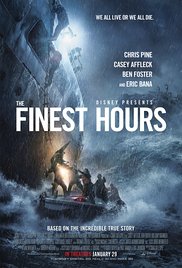
THE FINEST HOURS
US, 2016, 117 minutes, Colour.
Chris Pine, Casey Affleck, Ben Foster, Eric Bana, Holliday Grainger, John Ortiz.
Directed by Craig Gillespie.
The Finest Hours is a US and action adventure at sea, based on a true story.
In 1952, off the Massachusetts coast, a tanker was buffeted by waves and broke in half. There were other disasters at sea on the night. Someone on the coast, during the storm and lightning, saw the outline of the tanker and communicated with the local coastguard. The commander, not a local and so resented because of his accent and manner, ordered out a small boat to search for the stricken vessel. For many, it seemed something of a death sentence – nevertheless, the mission was successful.
The film starts rather slowly, establishing the character of Bernie Webber, a young coastguard officer, hesitant, a believer in regulations, and shy and awkward with girls. He has made an appointment to meet a young woman that he has been talking for some time on the phone. He is encouraged by his friend, Gus, and the two men meet girls and go to a dance. The girl, Miriam, is much less hesitant than Bernie and proposes to him – but he is troubled, willing, needing to ask his commanding officer.
Then the storm breaks and Bernie is put in charge of a small but competent boat, his friend, Richie, also somewhat critical of him, volunteers to go as do two other men. The difficulty is getting across the sand and rock bar of the harbour without running aground.
In the meantime we are treated to the powerful special effects for mountainous seas, vast waves, ocean turmoil and the breaking of the tanker. At two stages, the captain of each boat says to his men, “brace yourselves” – but that is something the audience has been doing in their seats for the previous 30 minutes so impacting in the effects.
In the meantime, Miriam is concerned, confronts the officer in charge, challenges his orders. Ultimately, she has to wait like everyone else on the docks, living in hope.
Because we know that the rescue was ultimately successful, the suspense is not in what will happen but how what will happen, the difficulties of Bernie in the small boat, the stalling the engine, the loss of the compass, and a sudden finding of the stricken tanker.
And, on the tanker, some of the men want to lower the lifeboats and escape, but the engineer in charge, Ray, tries to convince them that the lifeboats will be smashed to pieces very quickly. He uses his ingenuity and the loyalty of the crew to work on the engine, to continue maintaining the pumps, to construct a tiller for safe steering and the idea of reversing the tanker onto a reef so that it can be steady in case of rescue.
The film is well done, the rescue plot dominating the personal drama, so some audiences may find the film not to their taste, perhaps to documentary-like. Chris Pine, who has been the new Captain Kirk in the two recent Star Trek adventures, shows himself capable as Bernie. Casey Affleck has a strong role as Ray. Eric Bana is the commander and Holliday Grainger is Miriam.
A worthy drama and a tribute to the heroic efforts of those men in 1952.
1. A true story? The 1950s? American shipping? The coastguard? The reputation of the rescue?
2. The period, Massachusetts, the town, the coast, the diner, the dance, offices, homes, the docks? The musical score?
3. The impact of the special effects, the ships, the sea, the breaking of the tanker, the small boat, the rescue? The sea, the waves, breaking, the reef, the bar? Audience bracing themselves as did the characters?
4. The introduction to Bernie Webber, hesitant young man, rules and regulations, the phone calls to Miriam, Gus and his friendship, support? The dance, attraction towards Miriam? Her proposal, his hesitation, the aftermath, wanting to ask permission of his officer? Their going on the fishing boat?
5. The situations at sea, the coastguard, rescues, resources?
6. Bernie, awkward, directions, regulations jobs tying up ships, the old men, Cluff in charge, ridiculed for his accent, his orders, Bernie obeying, getting a crew, volunteers, sense of responsibility? His relationship with Ritchie, the past, differences, Ritchie volunteering, working with him, collaborating with him?
7. Going out, the small boat, the weather, the small crew, searchlight, the engine failing, being fixed, going over the bar? The dangers for the men’s falling overboard? Bernie and his experience, knowledge of the waters? Getting through, losing the compass? His holding his nerve, going out to search, reactions to the men? Listening, suddenly finding the ship?
8. On the ship, the visuals of the tanker breaking in half? The interiors of the remainder? The different decks? Ray, his competence, the men supporting him? Brown and his complaints, wanting to use the lifeboat, Ray and his warnings of destruction, breaking the lifeboat? Working the crew, the engine, the beam for steering, keeping the pumps going, the decision to reverse into the reef?
9. Bernie, the rescue, 32 men say, the men and the descent, the cook encouraging the younger one, the fatality? The young cook? Brown and his acknowledgement, Ray the last to leave?
10. Ray, in himself, quiet, strong, his ideas, working hard, the success?
11. Miriam, the coming to the centre, confronting Cluff, his reactions, communicating with Bernie, Bernie deciding to bypass regulations? The drive, the crash, the woman passing by, her brother-in-law who had seen the boat? Fixing the car, Miriam waiting?
12. The people on the wharf, turning on the car lights, welcoming the group back?
13. Photos during the final credits, the information about the rescue, the awards, the subsequent careers?
Published in Movie Reviews
Published in
Movie Reviews
Tagged under
Saturday, 18 September 2021 20:00
Grimsby
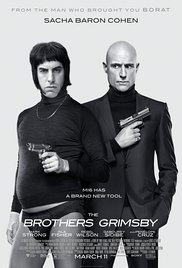
GRIMSBY
UK, 2016, 83 minutes, Colour.
Sacha Baron Cohen, Mark Strong, Rebel Wilson, Isla Fisher, Ian McShane?, Penelope Cruz, Tamsin Egerton, Ricky Tomlinson, Johnny Vegas, Scott Adkins, Gabourey Sidibe.
Directed by Louis Letterier.
An initial word is necessary for audiences contemplating going to see Grimsby. For those with high sensitivity and fastidious sensibility, probably best to give it a miss.
On the other hand, for those with a more robust sense of humour and a tolerance towards the crass, it is often very funny, as might be expected of a film with Sacha Baron Cohen. His initial career was in satiric comedy, creating the television character, Ali G, venturing into the movies as well. Ali G was intrusive, funny, controversial – with more than a touch of vulgarity. Then Baron Cohen won over audiences with his very funny satire, and the visit to Tajikistan, Borat. Bruno, his intrusive adventures and interviews in the United States, was less successful, but he made something of a comeback with The Dictator. He also appeared a number of films including Sweeney Todd and Les Miserables.
This film is much the same except… The setting is in the Northern British town, working town, Grimsby, where Baron Cohen plays Nobby Butcher, an awkward-looking (thanks to imitating Noel Gallagher), pot-bellied father of nine children, often with movie names like Django Unchained. (A lot of funny movie references, jokes about Daniel Radcliffe and Harry Potter and Aids, and satire on Donald Trump).He has a girlfriend, Dawn, played by Rebel Wilson. We are introduced to him in the pub, with fireworks in unseemly places, raucous laughter and pub friends like Ricky Tomlinson and Johnny Vegas. While fingers are poked at the citizens of Grimsby, and an acknowledgement that they often are called scum, he has real affection for them, the foibles and way of life. And the support of football teams and Britain in World Cups.
But, he has a deep yearning to find his younger brother, Sebastian, from whom he was separated when they became orphans and only one was adopted. There are photos, there are many flashbacks of the boys playing together and their separation, Nobby sacrificing himself for Sebastian. With this family emphasis, the characters and situations are made more humane than is usual in the film. It has also been scripted rather than relying on a lot of improvisation.
It is also a spy film. We soon discover that Sebastien is one of the arch-agents in pursuing criminals and getting information, lots of action chases. It would seem that this is the reason for the director, Louis Letterier (Transporter films and other action shows) to be brought in and provide a lot of adrenaline-action.
Of course, the two brothers meet, Nobby ruining his brother’s mission and getting him targeted as a rogue spy, hiding out in Grimsby, and going to pursue leads in Africa and, finally, a World Cup climax in Chile to save the world at a World Cup match.
Baron Cohen’s wife, Isla Fisher, plays the contact at MI6 and Ian McShane? in chain is the boss. On the other hand, Penelope Cruz is a villain (a surprise to see her here, although she was in Zoolander 2).
There are a lot of visual gags, but audiences may be wondering with all the verbal and visual jokes about masculine identity, sniggering jokes of the schoolboy kind, each one daring the audience to laugh and then moving on to yet another, more explicit, joke. People will be talking about the elephant sequence – absolutely crass, absolutely preposterous, yet given the humane aspects of the characterisations, more acceptable than it might have been!
There is plenty going on in the brief running time, a lot of corny jokes, misunderstandings, misinterpretations, but the action moving on quickly to the next episode and joke.
Mark Strong as Sebastian deserves great commendation for his playing everything straight and getting himself into all kinds of uncomfortable situations that he is never had to face in any other of his films.
1. Impact? Humour? The presence of Sacha Baron Cohen, his variety of impersonations? Satire and spoof?
2. Audience response to this kind of satire, spoof, jokes, crass jokes?
3. The work of the director, his reputation for action films, utilising his skill for this espionage story?
4. The title, the British town, the inhabitants, types, homes, pubs, football matches? Called scum? Travelling internationally? The pluses and minuses of these characters?
5. And the film made humane compared with other Baron Cohen films? Nobby, the kids, their movie names, relationship with Dawn, family values? Yearning for his brother? The many flashbacks, as boys together, invading the football field, pranks at home, orphans, going to the institution, adoption, the choice of only one, Nobby sacrificing himself? The humane aspects giving the film some emotion?
6. The spy situation, the conventions, the elaborate initial test for Sebastian? His supervisors? Jodie and her role, keeping him informed?
7. The range of jokes, some of them preposterous like that of the elephants? Jokes about masculinity, male identity, male sexuality, the jokes about male sexual behaviour?
8. Sacha Baron Cohen and his screen persona, his look, looking like Noel Gallagher, in action, close-ups, paunch, his teeth? The jokes?
9. Grimsby, the family, the range of friends in the pub, talking about his brother, the ordinary people, the pub scenes, the scenes in Chile? Dawn, blunt, at home, and Chile?
10. Nobby, discovering his brother, going to the meeting, wanting to bond, the poster and the penis joke, rubbing his fingers? Embracing his brother, the bad shot, the blame, Sebastian considered a rogue spy, the pursuit, the dangers? Nobby helping him to escape, the car, into the river? Taking Sebastian home, the privacy of the house, the kids, the pub and the party, Sebastian shooting, the team of the assassins, the kids defending their father and uncle, getting away, the trip to Africa?
11. The government, the commander, Jodie, Sebastian in action, the initial chase, the information, spectacular action? As rogue, the enemy assassins, the government bringing Chilcott into action, the pursuit?
12. Africa, the setup, the arrows and the sucking of the poison in time, at the hotel, the mistaken syringe and Sebastian getting the heroin? Nobby assuming his role, Jodie and the camera and her guidance? The woman in green, mixing up with the maid, the sexual encounter, the toilet, the discussions with the actual woman in green, the ambiguity of the conversation? The attack, Sebastian to the rescue? The long episode with the elephants? Preposterous and crass?
13. Information about Rhonda, the virus, the conference, the attempted assassination, the boy with AIDS, the shooting, the blood, Daniel Radcliffe and AIDS? The plan for Chile, the World Cup, Rhonda present, the plan, her motivations, exploitation, her thugs?
14. Nobby and Sebastian, the drug dealer in Africa and his sense of humour, flying them to Chile, in the procession, discovered by MI6?
15. Everyone in Chile, the plan, the disguise, the target, the two men getting onto the field, the Grimsby supporters, memories of the past, the shots, the AIDS boy and his falling, Daniel Radcliffe, Donald Trump and his getting the AIDS blood?
16. The confrontation, Nobby’s kids attacking Rhonda, the arrests, the sitting on the rockets, the injuries, Nobby and Sebastian in
hospital, the jokes about his wounds?
17. The happy ending and family?
Published in Movie Reviews
Published in
Movie Reviews
Tagged under
Saturday, 18 September 2021 20:00
Sini of Madelon Claudet, The
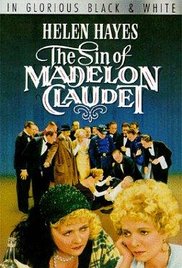
THE SIN OF MADELON CLAUDET
US, 1931, 75 minutes, Black and white.
Helen Hayes, Lewis Stone, Neil Hamilton, Robert Young, Cliff Edwards, Jean Hersholt, Karen Morley, Charles Winninger, Alan Hale, Halliwell Hobbs.
Directed by Edgar Selwyn.
The Sin of Madelon Claudet is a typical enough plot for the 1930s, seen in the several versions of Madame X, and various melodramas with Kay Francis, Bette Davis, Barbara Stanwyck.
The setting is Paris, something similar to that of Seventh Heaven for which Janet Gaynor won an Oscar. Helen Hayes won her Oscar for this film (later winning another in 1974 for Best Supporting Actress in Airport). She has to age from the young girl on the farm, to mother, to mistress of the wealthy count, to 10 years in prison, to going on the streets, becoming coarsened and older to the point of despair.
Neil Hamilton is the American artist in Paris who abandons her when she is pregnant. Lewis Stone is the count who is exposed for fraud and kills himself. Jean Hersholt is the sympathetic doctor and a very young Robert Young plays her son.
There is a lot of action in the 75 minutes of the running time, but is an opportunity to see a typical melodrama of the 1930s as well as Helen Hayes’ Oscar-winning performance.
1. A film of the 1930s? Drama, the touches of melodrama, ingredients of soap opera? Emotions? Situations and characters?
2. Black-and-white photography, the settings, decor, the times? Paris, France? The musical score?
3. The titles, expectations? Helen Hayes and her Oscar?
4. The popularity of this kind of story, the Madame X story? Mothers, illegitimate children, bringing them up, separation, self-sacrifice?
5. Introduction, the setting, the wife and her anger about her doctor husband, wanting to leave, his ambitions? The old doctor, telling her the story, the flashbacks?
6. Larry, in France, in love with Madelon, her father’s reaction, life in Normandy, the farm, her leaving, in Paris, Larry and his art, her pregnancy? The count, the visitor and the criticism of the paintings?
7. Larry, the message about the US, going back, losing contact with Madelon, his friends, family, marriage?
8. Rose and Victor, with the child, the struggle, work, pay, the visits, the photo opportunity?
9. The count and his life, society, Madelon as his mistress, money, giving away the ring to support Rose and Victor, Victor and his gambling? The count as a person, the proposal, the sudden exposure in the restaurant, killing himself?
10. Madelon in court, being found guilty, sentenced to 10 years, in the prison, with the nuns, work, Rose’s visit? Getting out, free, her hopes?
11. Going to the institution, seeing her son, his success, the discussions with the doctor, visiting the boy, talking, kissing him, telling him his mother was dead?
12. Trying to get jobs, failing, doors shut, on the streets, growing older, getting coarser, clients and clashes, money?
13. Larry, his studies, the friendship with the doctor, Madelon sending the money, his graduation?
14. Madelon and the clash with the police, going to the institution, asking for one more visit, the nurse, the photo, the interview with Larry,
leaving? His finding her, setting her up?
15. Larry, nice, his hard work, the doctors, marrying? The reconciliation with his wife?
16. Brief running time but plenty of plot? And the happy ending?
Published in Movie Reviews
Published in
Movie Reviews
Tagged under
Saturday, 18 September 2021 20:00
Zoolander 2
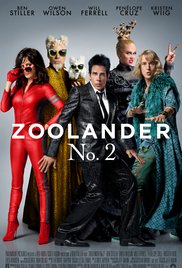
ZOOLANDER 2
US, 2016, 102 minutes, Colour.
Ben Stiller, Owen Wilson, Penelope Cruz, Will Ferrell, Benedict Cumberbatch, Justin Theroux, Kristin Wiig, Milla Jovovich, Olivia Munn, Christine Taylor, Susan Sarandon, Billy Zane, Justin Bieber, Kiefer Sutherland, Jerry Stiller, John Malkovich, Cyrus Arnold, Anna Wintour, Lenny Kravitz, Naomi Campbell, Sting, Kate Moss, Lewis Hamilton, Susan Boyle, Tommy Hilfiger, Matt Lauer.
Directed by Ben Stiller.
A lot of people found Zoolander very funny in 2001 – and a number did not, thinking that it was a rather silly spoof. It is surprising to find that it is 15 years between the original and the sequel, which a number of people have found very funny in 2016 and a number have not, thinking it was a rather silly spoof.
This review comes down more in favour of funny than silly, though it certainly is very silly at times.
Ben Stiller and his friend Owen Wilson created the characters, Zoolander and Hansel, male models. Derek Zoolander was a dumb character famous for his facial poses, especially Blue Steel, which Ben Stiller capitalises on here. In the past, the couple got into quite a number of tangles, especially through their dastardly and jealous competitor, Mugatu, Will Ferrell.
Now, in In 2016, Derek is living in the vast and snowbound North New Jersey, morning his dead wife and the son who has disappeared, while Hansel seems exiled with his harem (something of a United Nations group) in the vast dunes of Malibu. Although their foe, Mugatu, is in prison, he has the models in his sights and has a scheme to abduct Zoolander’s son from his Italian boarding school. In the meantime, a number of models are being found murdered, faces contorted by Blue Steel poses – the film being introduced amusingly by Justin Bieber being chased through the streets of Rome and his death mask as Blue Steel. Enter the Interpol fashion police force in the person Penelope Cruz who teams up with pair when they arrive in Rome.
What follows is a mixture of police drama and chases, stupid activities by the models, the transformation of Zoolander’s son who becomes something of a target because he is believed to be the fountain of life.
If you are able to accept this kind of nonsense, and that is the nature of the film, there is much to amuse. and, in the meantime, an overload of guest stars provide entertaining cameos – with Billy Zane and Kiefer Sutherland playing more significant roles, and especially one at Rome airport with the paparazzi greeting Susan Boyle, the surprise performance by Benedict Cumberbatch, with actors wandering in and out like Willie Nelson or John Malkovich, and sports personalities like Lewis Hamilton and fashion personalities like Anna Wintour becoming involved.
It certainly won’t remain in the memory but, for its time on screen, there is quite an amount of amusement.
1. The popularity of the original film, characters? A film of 2001, the beginning of a new century? The comedy, spoofs? The many years before the sequel? Continuing the story, the absence from fashion over the years, the new generation of models, the continued spoof of fashion? The fashion world, comedy, and the thriller elements of the film?
2. The cast continuing, Ben Stiller as Derek, Owen Wilson as Hansel, Will Ferrell as Magutu? The range of guests stars and cameos, the effect? Derek and his being in the frozen north of New Jersey? Hansel and the deserts of Malibu? Derek and the loss of his child, the death of his wife, the plan for the building and its collapse? Hansel and his multinational group and harem, The Orgy? Magutu in prison? The introduction of Penelope Cruz, Interpol, fashion department? Billy Zane as himself, the visit to each of the men, arguing that they should make a comeback? Kiefer Sutherland as himself, as part of The Orgy group, their all being pregnant? Guests from the world of fashion, especially the final confrontation, sports figures, stars, the effect? Kristin Wiig in disguise?
3. The prologue, the pursuit through Rome, the cars, the chase, the Instagram and the photo of Facebook – and the spoof with Justin Bieber? Billy Zane, his search, urging each of the two to return? Their meeting, Hansel and his being upset by his scar, removing the iron mask, the minimal scratch? The clashing, yet deciding to be together, capitalising on their fame?
4. Italy, Interpol, Penelope Cruz, staff, the murders of all the popstars? All with Derek’s look? Discovering that both were in Italy – and the airport sequence, thinking they were celebrities? And everybody wanting to photograph Susan Boyle?
5. The fashion expert, wanting her own company, Kristin Wiig week in disguise? The link with Magutu in prison? The jokes?
6. Going to the school, Derek trying to find his son, picking the wrong one, the fat boy? The games? The discussions with the headmaster – and the joke with Justin Theroux, one of the writers of the screenplay? The plans, Derek and the son, going out, enjoying things together, the son giving up, hating his father? His being abducted?
7. Meeting the new generation, the personalities, the enthusiasm? The cameo by Benedict Cumberbatch as All, transsexual, multi-sexual, the extravagant performance? The two being poked fun at – and their labels, old and the mispronunciation of lame?
8. Magutu in prison, the years, Derek visiting, Magutu exploiting psychology and Derek getting everything wrong? Magutu, his escape, shedding his skin, his hair emerging? The plot?
9. Penelope Cruz, the collaboration with Derek, her back story, model, swimsuits, swimming back to Rome?
10. The son, the rescue, the changed attitude?
11. The romance between Ben Stiller and Penelope Cruz? The Orgy group and their all being pregnant, children?
12. The comeback, having the look or not, wanting to stop the weapons – but failing?
13. The issue of the fountain of youth, the boy being the fountain, the discussions with Sting, his explanations? The truth?
14. The confrontation with Magutu, his defeat?
15. Happily family, altogether and a new child?
16. Everybody joining in with the song and dance the final credits?
17. An entertaining spoof?
Published in Movie Reviews
Published in
Movie Reviews
Tagged under
Saturday, 18 September 2021 20:00
2016
reviews
Published in Movie Reviews
Published in
Movie Reviews
Tagged under
Saturday, 18 September 2021 20:00
Looking for Grace
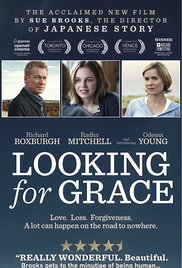
LOOKING FOR GRACE
Australia, 2015, 100 minutes, Colour.
Richard Roxburgh, Radha Mitchell, Odessa Young, Terry Norris, Julia Blake, Kenya Pearson, Myles Pollard, Tasma Walton, Harry Richardson, Peter Rowsthorn.
Directed by Sue Brooks.
Writer and director, Sue Books, has made only a few films, Road to Nhill and Japanese Story, each set in outback regions of Australia. She has returned to the outback for Looking for Grace, shot on location in Western Australia, desert and wheat country.
There is some obvious ambiguity in the title, Grace as a person who is being sought and grace as something good in people, a powerful redemption.
The key aspect of the film is the fact that it tells the one story but from five different perspectives, something of a jigsaw puzzle, significant pieces, sometimes random-seeming pieces, but coming together in the search for Grace and the aftermath.
The first story told is that of Grace herself. Grace is played by the talented young actress, Odessa Young, who also appears to great advantage in the title role of the adaptation of Henrik Ibsen’s The Wild Duck, The Daughter. She is a teenager, some difficulties with her parents, moderate really, but she decides to go off with her school friend from Perth to travel by bus to Ceduna for a concert. All she leaves in the kitchen is a note saying, Sorry, Mum. We see Grace and her friend, Sappho, on the bus, meeting a handsome young traveller, and some interaction with him, that leads to Grace being stranded.
Surprisingly, the second story is that of Bruce, a truck driver with a little boy whom he takes on his journeys. It just seems there for some colourful background to the film until quite a sudden shock, physically jolting the audience, towards the end of the film.
The next story is that of Tom, an elderly man, retired, but a private detective who can’t keep still and wants to be on the job, married for a long time, the touch of vanity, the loving tensions with his wife. Tom and his wife are played by real-life husband and wife actors, Terry Norris and Julia Blake. Tom has quite a bit to do in the film and this is one of Terry Norris’s most engaging performances.
As might be imagined, the other two stories of those of Grace’s parents, Dan, who owns a furniture shop in the city, who comes across rather differently in each of the other stories, sometimes unlikeable, sometimes diffident, sometimes genial with his daughter. And the subplot about his relationship with one of his staff at the store and discussing the issues with Tom makes the story more interesting. Dan is played by Richard Roxburgh.
Denise is his wife, played by Radha Mitchell, mainly seen at home, in an enjoyably superfluous scene about the cleaning of her furniture, phoning her husband at work, then on the road looking for Grace, revealing a secret to Grace – and, significantly, stopping for a toilet break on the way home.
In many ways, the film is bits and pieces, some of them significant, many of them quite slight, and a number seeming more significant than they turned out actually to be. For this reviewer, this made the impact less telling than many other reviewers have found. But it needs to be seen in the context of the contemporary Australian cinema scene – and the emergence of Odessa Young as a strong screen presence.
1. The title, the focus, the different stories, grace and redemption?
2. The writer-director, her perspective, on Greece, on the women, on the men?
3. The locations, Western Australia, the desert, the sheep country, the open road? Bus trips, stations and motels? Holmes? Perth, the city? Police? The range of the musical score and its corresponding to different moods and characters?
4. The structure, the many stories, Grace first, Bruce, Tom, Dan, Denise? Like a puzzle, jigsaw, the pieces, overlapping, the different perspectives?
5. The basic narrative, grace, her age, relationship with her parents, taking the money, travelling to Ceduna and the concert, the note with Sorry, Mum, in the company of Sappho, chatting, Jamie getting on the bus, their sex quiz and what it revealed? Sappho, upset with Grace, the motel, staying the night, deciding to stay? Grace continuing on the bus, the meal with Jamie, the sex and his approach, pleasant, wishing her well but stealing money? Grace asking about the payment? The reaction of the people? Walking away, sleeping in the truck, running from her parents?
6. The story of Bruce, driving the truck, his work, with Philip, – and his disappearing from the film until the shocking accident?
7. Tom, in the mirror, his teeth and the effect of the toothpaste the discussions with his wife, their arguments, the phone call and his kind of the job, private detective, packing, number of underpants, each of them fussing? Meeting the parents? The discussions, his work, the police? His travelling with the couple, helping, information about the cash? The Frank Talk with Dan about relationships, his temptation to an affair, his fit on the bed, getting better, assisting after the accident?
8. Denise and Dan, the tensions in the marriage, the search for Grace, Denise telling Grace about person when she was 17 and his not contacting her? Not telling Dan? At home, the cleaners and discussion about the lounge? The phone calls to Dan, his being absent? The news, the group, the supporting families, the information about Sappho, Rosemary and leaving, Denise concerned about driving? Leaving with Tom and Dan, finding Grace, talking, telling her the truth, the toilet stop, the suddenness of her accident?
9. Dan, different perspectives on him, his behaviour with Grace, behaviour with Denise? As a father? His shop, management, secretary, the affair, the protracted awkwardness of the motel, his liking the room, the woman and her place in the shop, his hesitations, feeling sick? Return, the phone calls from Denise? Finding Grace, his complaint about the smell of her shoes? The discussion with Tom and its frankness? The toilet breaks, the accident?
10. The ambulance, following the car, stopping, the paramedics getting out, Denise’s death? The effect on everyone?
11. The money being found, Denise dead, Dan and his future, Grace and her future?
Published in Movie Reviews
Published in
Movie Reviews
Tagged under